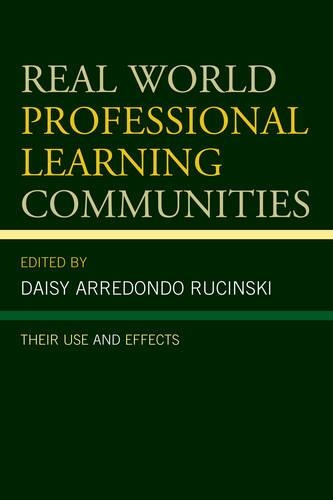
Real World Professional Learning Communities: Their Use and Effects
(Hardback)
Available Formats
Publishing Details
Real World Professional Learning Communities: Their Use and Effects
By (Author) Daisy Arredondo Rucinski
Bloomsbury Publishing PLC
Rowman & Littlefield Publishers
8th December 2016
United States
Classifications
Professional and Scholarly
Non Fiction
371.1
Physical Properties
Hardback
228
Width 159mm, Height 239mm, Spine 22mm
531g
Description
In a professional learning community (PLC), teachers are organized into teams, committed to meeting on a regular basis to study their teaching strategies and the effects of those strategies on the students in their classrooms. The teacher teams can be of varied form and composition. Whatever the organizational structure, the teams have one goal that is to improve teaching so that student learning is improved. Policy developers, legislators, and educational leaders have encouraged the adoption of collaborative professional learning teams as a school reform model for improving schools. In this book we describe the results of studies of professional learning communities in real schools and the effects of the teams on student learning. Much of the time school innovations are not examined in depth. Instead authors and developers simply advocate that they be used. In this book, school principals and administrators describe how their teachers used the PLC teams to improve student learning in their schools. In other words, this book presents actual research on the effects of the use of PLCs rather than testimonials.
Reviews
In this book scholar-practitioners provide reasons to be hopeful about educational practice in a current, dark era of accountability reform. Their research vividly portrays the professional learning community as a viable and meaningful strategy for studying and improving teaching and learning at all scholastic levels. Their collective voices demonstrate how, as educators work hard together, intelligent and productive insight can emerge in the spaces between people. The final chapter presents a synthesis of the major ideas and implications for both research and practice. The book will appeal to educators involved in public schooling and pre-service training, as well as parents and policy makers, those who recognize the significance of renewal and growth through collective wisdom as demonstrated by the authors themselves. -- Noreen B. Garman, PhD, professor, administrative and policy studies, University of Pittsburgh
In Real-World Professional Learning Communities, Arredondo Rucinski has provided a fresh and needed look at the phenomenon of professional learning communities. Starting with a healthy skepticism about the nature and effectiveness of PLCs, the author/editor and her colleagues not only implemented the process in a variety of real world situations, but also identified the critical components of successful executions of this ever-growing innovation. This book should help anyone wishing to understand what works and what does not work when designing and implementing an effective PLC. -- Robert J. Marzano, cofounder and CEO, Marzano Research Laboratory
Arredondo Rucinski has invited key stakeholders to crucial conversation around Professional Learning Communities. In her approach we benefit from the perspectives of leading researchers, district leaders, classroom teachers, and school leaders. It is typical to consider the perspective of one or two of these constituencies but it is refreshing and exciting to benefit from a broad range of educators all of whom share in a commitment to thoughtful, practical, and impactful learning communities. -- Zach Kelehear, Dean of the College of Education and Vice President for Instruction and Innovation, Augusta University
Author Bio
Daisy Arredondo Rucinski is professor of educational leadership and policy studies at The University of Alabama, Tuscaloosa, AL. She holds a Ph.D. degree from the University of Washington. She has been a biology, Spanish, and algebra teacher, a high school assistant principal, an assistant superintendent for curriculum and instruction, a deputy superintendent, and a Senior Fulbright Scholar in Santiago, Chile. Her research interests are instructional leadership and supervision, professional development, school effectiveness, and reflective learning. She writes about these topics and related policy issues.
